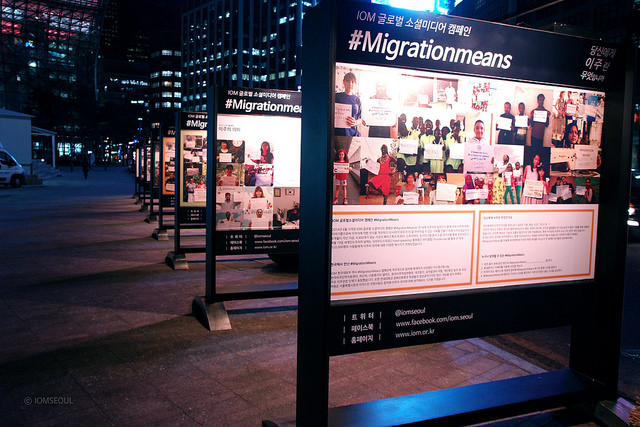Updated
On International Migrant’s Day, A Look at the Moroccan Approach – Caitlin Dearing Scott

Photo: UN Migration Agency (IOM)
Caitlin Dearing Scott
December 18, 2017
The 2017 edition of International Migrant’s Day – observed every December 18 to promote the protection of migrants worldwide – is dedicated to “Safe Migration in a World on the Move” and the theme could not be more relevant given the stream of migration tragedies that occur daily around the globe, particularly around the Mediterranean crossings to Europe. Morocco has not been immune to these tragedies, as it is a source, destination, and transit country located at the crossroads of Africa and Europe.
Recent headlines have highlighted the plight of migrants, but beyond the headlines, much is being done both in Morocco and in Africa that deserves recognition this International Migrant’s Day because it is only through improving conditions in source countries that the challenges of migration can be overcome.
Morocco has been working to improve its own migration policies since 2013 when it adopted a new immigration policy providing protections for migrants and asylum seekers. It was the first country in the Arab world to develop such a policy. Implementation of the first phase of the campaign took place in 2014 and regularized the status of 25,000 migrants, providing them with residency papers and work permits. Implementation of the second phase, to regularize foreigners with five years of residency in Morocco, those with chronic illnesses, and foreign spouses and children of Moroccan citizens began late last year. The country still has a long way to go, but its vision and its policy are on the right track, which is important as Morocco expands its migration policy efforts beyond its borders.
Since rejoining the African Union in January 2017, the Kingdom has been spearheading continental efforts to address migration, with King Mohammed VI serving as Leader of the African Union program on migration. In this capacity, Morocco has played a key role in EU-Africa relations on the subject, and the King has been vocal about the need for a new vision and approach to the issue. In a speech to the 5th African Union-European Union Summit on November 29, he called for reframing the issue: “Having been a migrant-emitting, transit, and destination country, Morocco has developed an introspective approach to the migration issue, which it perceives in an inclusive, positive light…We realize the challenges posed by migration, but we are also aware of its positive aspects…we ought to turn immigration into a subject of peaceful debate and constructive exchange.”
Toward that end, King Mohammed VI outlined and corrected four myths about migration that have obstructed development of appropriate policy responses:
- African migration is not mostly intercontinental. It is primarily intra-African: out of every 5 African migrants, 4 remain in Africa;
- Irregular migration does not predominate; it accounts for a mere 20% of international migration;
- Migration does not impoverish host countries: 85% of migrants’ earnings remain in host countries; and
- There is no longer any distinction between migrant-emitting, transit, and destination countries.
The King urged action on migration, calling on African countries to “shoulder their responsibilities in terms of guaranteeing the rights and dignity of African migrants on their soil,” and for a change in European policy to overcome mistrust of migration in order to develop effective solutions. Of course translating words into actions is the hard part, but acknowledging the benefits – and realities – of migration seems like a good place to start in order to develop practical – and humane – policy solutions.
